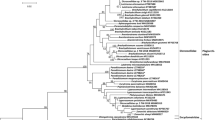Abstract
I AGREE with H. S. Jefferies that historical accuracy is desirable and that the credit for scientific discovery should go where it is deserved. Parasitology owes much to the work of Steenstrup, who demonstrated the ‘alternation of generations’ which occurs in the lives of some invertebrate animals1. This expression was first used in 1819, however, by the Franco-German poet and naturalist, Louis Adelaide de Chamisso, in regard to the life-cycle of the pelagic tunicates known as salps, but the young Danish zoologists showed that it applies to the life-cycles of some cœlenterates, trematodes and other invertebrate animals as well. Valuable discoveries were made also by other zoologists, and some of these were mentioned in Chapter 16 and elsewhere in my book2, and others have since been indicated by E. G. Reinhard, with special reference to the life-cycle of Fasciola hepatica 3.
Similar content being viewed by others
References
Steenstrup, J. J. M., “On the Alternation of Generations;..” (The Ray Society, London, 1845) (first published 1842 in Copenhagen).
Dawes, Ben, “The Trematoda” (Camb. Univ. Press, 1946, 1956).
Reinhard, E. G., Exp. Parasitol., 6, 208 (1957).
Author information
Authors and Affiliations
Rights and permissions
About this article
Cite this article
DAWES, B. Elucidation of the Life-cycle of Fasciola hepatica . Nature 185, 331–332 (1960). https://doi.org/10.1038/185331b0
Issue Date:
DOI: https://doi.org/10.1038/185331b0
- Springer Nature Limited





